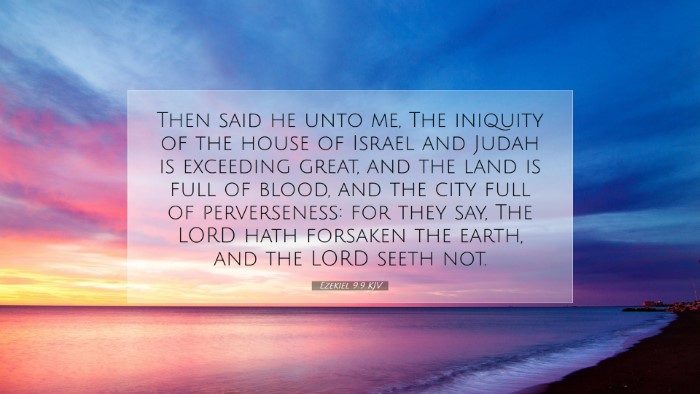Ezekiel 9:9 - Commentary Summary
Bible Verse: "Then said he unto me, The iniquity of the house of Israel and Judah is exceeding great, and the land is full of blood, and the city is full of perverseness: for they say, The Lord hath forsaken the earth, and the Lord seeth not." (Ezekiel 9:9, KJV)
Introduction
The verse from Ezekiel 9:9 serves as a solemn statement regarding the condition of Israel and Judah. It highlights the gravity of their iniquities and the consequences of their moral decay. The significance of this passage is elucidated through various public domain commentaries that delve into its theological implications and contextual background.
Contextual Background
Ezekiel, a prophet during the Babylonian exile, was called to warn the people of Israel about impending judgment. The historical context of this verse is critical as it reflects the societal dynamics of a nation in rebellion against God. The iniquities mentioned encompass idolatry, bloodshed, and a general disregard for divine authority, leading to a dire situation that prompted God's warning through Ezekiel.
Insights from Public Domain Commentaries
Matthew Henry's Commentary
Matthew Henry emphasizes the seriousness of sin as outlined in this verse. He notes that the "iniquity of the house of Israel and Judah" was not merely a personal failure but a collective moral degradation. Henry points out that the land being "full of blood" indicates a societal breakdown resulting from violence and injustice, revealing both the spiritual and civil corruption of the people.
Henry further explains that the people's claim, "The Lord hath forsaken the earth," reflects a deep-seated spiritual apathy and a sense of abandonment. This attitude reveals their failure to recognize God's continual presence and justice amidst their troubles. He cautions that such beliefs lead to moral laxity and a disconnection from divine accountability.
Albert Barnes' Notes on the Bible
Albert Barnes provides a detailed analysis of the phrase "exceeding great" in reference to the iniquities of Israel. He interprets this as an indication of both quantity and severity, asserting that their sins are not only many but also deeply rooted in intentionality against God's commandments. The use of the word "perverseness" indicates a willful turning away from the righteousness ordained by the Lord.
Barnes highlights that the mention of blood relates to personal guilt and the societal implications of violence—both spiritual and physical. He stresses that the rebellion of the people led them to believe they could act without fear of divine oversight, which led to a pervasive culture of sin. This commentary serves as a dire warning of what happens when a society forsakes moral and spiritual truths.
Adam Clarke's Commentary
Adam Clarke elaborates on the spiritual implications of the people’s claims that "the Lord seeth not." He argues that such a declaration reveals a foundational misunderstanding of God's omnipresence and omniscience. Clarke suggests that this attitude not only represents an external reproach against God but signifies a profound internal conflict where the people convince themselves of their unaccountability.
Clarke also addresses the broader consequences of such a collective mindset on the nation, noting that it contributes to further moral decay and a hardening of hearts. This self-deception stands as a cautionary tale for individuals and societies that forsake the acknowledgment of God’s influence in governance and personal conduct.
Theological Implications
This passage holds significant theological implications that deserve examination by pastors, students, and scholars. The idea that sin has created an abyss between God and His people alerts believers to the dangers of complacency in faith. The acknowledgment of iniquity as a societal issue rather than merely personal reflects the collectivist nature of sin and repentance that must be approached from a communal perspective as well.
Practical Applications
For contemporary application, this verse encourages individuals and congregations to reflect on the moral state of their communities. It motivates church leaders to engage in active discussions about social justice, accountability, and the importance of living in accordance with God’s principles. The notion that God sees all actions should serve as both a comfort and a warning against moral decay.
Conclusion
Ezekiel 9:9 is a profound reminder of the consequences of a nation turning away from God. Through the insights of Matthew Henry, Albert Barnes, and Adam Clarke, we are left with a sobering reflection on the state of our spiritual lives and our communities. The call to recognize and address iniquity is timeless and bears relevance for every generation of believers.


